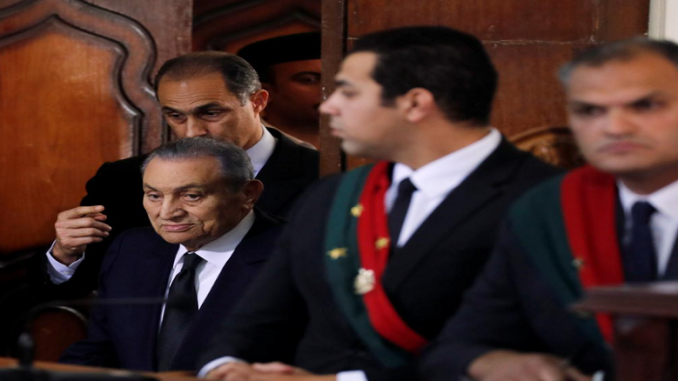
Two protagonists of Egypt’s recent history faced each other in court on Wednesday, with toppled strongman Hosni Mubarak testifying for the first time against Egypt’s first freely elected president, Mohamed Morsi.
Overthrown during the 2011 protests that ended his 30-year rule, a frail, grey-haired Mubarak could be seen walking into the courtroom with a cane on Wednesday.
Mubarak, 90, gave evidence for an hour and a half at the high-security prison complex in southern Cairo where Morsi is detained. Wearing a dark suit and using a walking stick, he was escorted into the courtroom by his two sons.
Morsi was dressed in prison overalls and seated in a thick glass and metal cage running down one side of the courtroom,
A visibly frail Mubarak, who was given a chair at the witness stand due to his age, was asked dozens of questions by the judge about security developments as the uprising against his 30-year rule gathered pace.
Speaking in a gravelly voice that gradually became stronger, he at times appeared impatient, saying he had no information or details.
Quizzed on alleged infiltration by foreign militants, he said his head of general intelligence had told him on Jan. 29, 2011 of hundreds of people crossing Egypt’s border from the Gaza Strip to support the Brotherhood.
“He told me that there are armed groups which have infiltrated the borders with great numbers, around 800 people,” he told the court.
During his testimony against Morsi , Egypt’s first democratically elected president, and January 25 revolution, 90-year-old Mubarak claimed he could not answer most questions, saying he needed permission from the military and Abdel Fattah el-Sisi.
Since his removal from power in a military coup staged by Sisi, Morsi has been tried in several different cases.
In April 2015, he was sentenced to 20 years on charges of ordering the arrest and torture of protesters in clashes outside the presidential palace in 2012.
In September 2016, Morsi was sentenced to another 25 years in prison on charges of passing intelligence to Qatar. And in December 2017, he was also sentenced to three years on charges of insulting the judiciary.
After Morsi’s 2013 removal, Sisi unleashed a fierce crackdown on his opponents, with tens of thousands jailed with charge and without in conditions condemned by human rights groups.
Amnesty International has described Egypt’s judicial system as “horrendously broken” and described death sentences handed out to Morsi and other members of the Muslim Brotherhood in previous trials as a “vengeful march to the gallows.”
In a report released in March, a panel of British MPs and lawyers said Morsi’s conditions of imprisonment had left him facing a “premature death”.
The panel, which was commissioned by Morsi’s family, said the former leader is “receiving inadequate medical care, particularly inadequate management of his diabetes, and inadequate management of his liver disease”.
“The consequence of this inadequate care is likely to be rapid deterioration of his long-term conditions, which is likely to lead to premature death,” it said.
Defendants’ relatives said they saw little hope of seeing justice.
“The court is farcical and the case is farcical,” said one, who asked not to be named.


